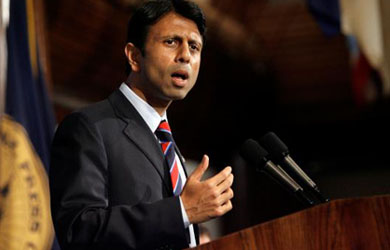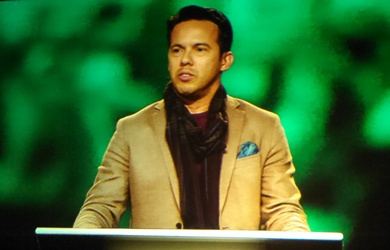In recent days there have appeared two pieces that have generated a lot of attention suggesting that the Religious Right days as a political and cultural force are coming to an end.
The first was Kathleen Parker’s column covering the recent skirmish between right-wing radio host Steve Deace and Tom Minnery of Focus on the Family about James Dobson’s and Focus on the Family’s support of John McCain’s presidential campaign. In this fight, Parker sees evidence that “the Christian right [might be] finished as a political entity”:
Deace’s point was that established Christian activist groups too often settle for lesser evils in exchange for electing Republicans. He cited as examples Dobson’s support of Mitt Romney and John McCain, neither of whom is pro-life or pro-family enough from Deace’s perspective.
Compromise may be the grease of politics, but it has no place in Christian orthodoxy, according to Deace.
Put another way, Christians may have no place in the political fray of dealmaking. That doesn’t mean one disengages from political life, but it might mean that the church shouldn’t be a branch of the Republican Party. It might mean trading fame and fortune (green rooms and fundraisers) for humility and charity.
Deace’s radio show may be beneath the radar of most Americans and even most Christians, but he is not alone in his thinking. I was alerted to the Deace-Minnery interview by E. Ray Moore — founder of the South Carolina-based Exodus Mandate, an initiative to encourage Christian education and home schooling. Moore, who considers himself a member of the Christian right, thinks the movement is imploding.
“It’s hard to admit defeat, but this one was self-inflicted,” he wrote in an e-mail. “Yes, Dr. Dobson and the pro-family or Christian right political movement is a failure; it would have made me sad to say this in the past, but they have done it to themselves.”
A somewhat similar article appears as the cover story of the upcoming issue of Newsweek in which author Jon Meacham predicts that the most recent American Religious Identification Survey showing a rise in the number of self-identified non-believers signals that the United States may be moving into a “post-Christian” era:
This is not to say that the Christian God is dead, but that he is less of a force in American politics and culture than at any other time in recent memory. To the surprise of liberals who fear the advent of an evangelical theocracy and to the dismay of religious conservatives who long to see their faith more fully expressed in public life, Christians are now making up a declining percentage of the American population.
Much of Meacham’s piece is predicated on concerns raised by Al Mohler, president of the Southern Baptist Theological Seminary, who notes that, according to the survey, “the Northeast emerged in 2008 as the new stronghold of the religiously unidentified” which signals that “the historic foundation of America’s religious culture was cracking:
“The post-Christian narrative is radically different; it offers spirituality, however defined, without binding authority,” [Mohler] told me. “It is based on an understanding of history that presumes a less tolerant past and a more tolerant future, with the present as an important transitional step.” The present, in this sense, is less about the death of God and more about the birth of many gods. The rising numbers of religiously unaffiliated Americans are people more apt to call themselves “spiritual” rather than “religious.”
…
Evangelical Christians have long believed that the United States should be a nation whose political life is based upon and governed by their interpretation of biblical and theological principles. If the church believes drinking to be a sin, for instance, then the laws of the state should ban the consumption of alcohol. If the church believes the theory of evolution conflicts with a literal reading of the Book of Genesis, then the public schools should tailor their lessons accordingly. If the church believes abortion should be outlawed, then the legislatures and courts of the land should follow suit. The intensity of feeling about how Christian the nation should be has ebbed and flowed since Jamestown; there is, as the Bible says, no thing new under the sun. For more than 40 years, the debate that began with the Supreme Court’s decision to end mandatory school prayer in 1962 (and accelerated with the Roe v. Wade ruling 11 years later) may not have been novel, but it has been ferocious. Fearing the coming of a Europe-like secular state, the right longed to engineer a return to what it believed was a Christian America of yore.
But that project has failed, at least for now. In Texas, authorities have decided to side with science, not theology, in a dispute over the teaching of evolution. The terrible economic times have not led to an increase in church attendance. In Iowa last Friday, the state Supreme Court ruled against a ban on same-sex marriage, a defeat for religious conservatives. Such evidence is what has believers fretting about the possibility of an age dominated by a newly muscular secularism. “The moral teachings of Christianity have exerted an incalculable influence on Western civilization,” Mohler says. “As those moral teachings fade into cultural memory, a secularized morality takes their place. Once Christianity is abandoned by a significant portion of the population, the moral landscape necessarily changes. For the better part of the 20th century, the nations of Western Europe led the way in the abandonment of Christian commitments. Christian moral reflexes and moral principles gave way to the loosening grip of a Christian memory. Now even that Christian memory is absent from the lives of millions.”
I have to say I find this temptation from commentators to write the Religious Right’s obituary after every Republican electoral setback rather remarkable. For one thing, as we pointed out not too long ago, these sorts of pieces appear every few years, only to be overtaken a short time later with pieces marveling that the “sudden” and “unexpected” resurgence of the “values voters” crowd. In addition, despite the gloominess from the likes of Mohler and Deace, the Religious Right is more committed than ever to regrouping as a “resistance movement” to fight for its agenda and eventually regain its position as an influential and powerful political and social force.
And that day may come sooner than many realize. While it might seem at the moment that the Religious Right is on its way out, it is important to remember that the GOP has lost exactly one mid-term election and one presidential election and Democrats have controlled Congress and the White House for less than three months.
Doesn’t anyone else remember all the talk following George W. Bush’s election, and especially his re-election, about the “values voters” and coming of a “permanent Republican majority” which would give the GOP ironclad control over the reigns of government for decades to come?
Remind me again: how did that all work out?
The point is that political fortunes change … and often change rapidly. It is far, far too early to be declaring the Religious Right to be dead based on two elections and three months of Democratic government.
Frankly, the Religious Right’s political clout has never really been tested and so it is hard to know just if they are losing power because whenever the GOP wins elections, the Right is quick to claim credit for mobilizing grassroots support, but when the GOP loses the Right is quick to chalk the loss up to the party’s failure to embrace the right-wing agenda.
There are really only two scenarios under which predictions about the Right’s demise can reliably be made. The first is a situation in which the GOP nominates a hard-line, right-wing true believer – someone like Rick Santorum – as its presidential candidate and sees that candidate get destroyed nationwide on Election Day. The second is if the GOP can manage to actually nominate a presidential candidate who is fundamentally unacceptable to the Right – someone like Rudy Giuliani – and then have that candidate go on to win election to the White House.
But until the GOP nominates a true-believer and loses or right-wing heretic and wins, the Religious Right will continue to maintain a very significant amount of control of one of our nation’s two main political parties … and no amount of punditry announcing its demise will change that fact.








